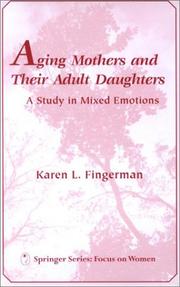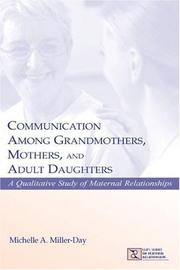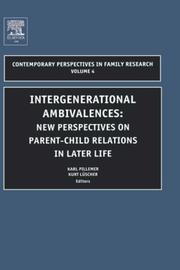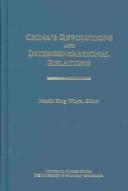| Listing 1 - 10 of 17 | << page >> |
Sort by
|

ISBN: 1281806277 9786611806279 0826116116 9780826116116 0826113796 9780826113795 Year: 2001 Publisher: New York Springer Pub.
Abstract | Keywords | Export | Availability | Bookmark
 Loading...
Loading...Choose an application
- Reference Manager
- EndNote
- RefWorks (Direct export to RefWorks)
""As far as I am aware, there is no other scholarly book on adult mother/daughter relationships, particularly one that incorporates data from pairs of mothers and daughters...I believe that the contents provide useful material for instructors, researchers, and therapists alike."". - Rosemary Blieszner, PhD. Professor of Gerontology and Family Studies. Virginia Polytechnic Institute and State University. The mother/daughter tie is one that persists well past childhood and it takes on unique characteristics as daughter enter midlife and mohers enter old age. Incorporating vivid descriptions by m
Aging parents. --- Family life surveys. --- Mothers and daughters. --- Parent and adult child. --- Social surveys --- Elderly parents --- Parents, Aged --- Parents --- Sandwich generation --- Adult child and parent --- Adult children and parents --- Parent-adult child relations --- Parents and adult children --- Parent and child --- Adult children living with parents --- Daughters and mothers --- Daughters --- Girls --- Mother and child
Book
ISBN: 1283260093 9786613260093 9048521688 9789048521685 9789069845494 9069845490 9781283260091 6613260096 Year: 2008 Publisher: The Hague Netherlands interdisciplinary demographic institute
Abstract | Keywords | Export | Availability | Bookmark
 Loading...
Loading...Choose an application
- Reference Manager
- EndNote
- RefWorks (Direct export to RefWorks)
At present, our knowledge of the current state of solidarity between parents and their adult children in Europe is limited. Insight into contemporary intergenerational solidarity is not only important for the well-being of individuals but is also of great interest to policy makers. Patterns of intergenerational solidarity are not only affected by social policies and services but also reveal a number of important social policy issues and dilemmas. Will encouraging labour force participation among women and older workers mean they have less time to care for their dependents? Should formal care services be further expanded to relieve the burden faced by family members with the risk that they start to replace informal care?
This report aims to contribute to this insight by providing a more differentiated picture of the strength, nature and direction of solidarity between parents and their adult children, its variation among European countries and its determinants. Our findings indicate that parent-child ties are quite strong. The majority of Europeans aged 50 and over live in close proximity and are in frequent contact with at least one of the children. Moreover, strong family care obligations still exist and a substantial amount of support is being exchanged between parents and their non-co resident children.
Interesting differences, however, emerge between individuals and countries. While fathers are more inclined to assist their children financially, mothers have more frequent contact and exchange more help in kind with their children. Being religious and having a large family have a positive impact on several dimensions of intergenerational solidarity. Parental divorce and a better socioeconomic position of parents and children, on the other hand, lead to a weakening of parent-child ties in many respects. Contrary to common belief, employed children show solidarity with their parents as much as those without a paid job. Differences in the nature of intergenerational solidarity between the European countries tend to follow the general division into an individualistic north and a familistic south.
Parent and adult child --- Adult child and parent --- Adult children and parents --- Parent-adult child relations --- Parents and adult children --- Parent and child --- Adult children living with parents --- Sandwich generation --- #SBIB:314H127 --- #SBIB:314H210 --- #SBIB:316.356.2H2221 --- Demografie --- Regionale bevolkingsstudies: Europa --- Demografie: algemeenheden --- Gezinssociologie: ouders-kind relaties

ISBN: 1135643326 1282322664 9786612322662 1410612120 9781410612120 9781135643317 1135643318 1417545461 9781417545469 9780805839791 0805839798 9781135643270 9781135643324 9781138813045 Year: 2004 Publisher: Mahwah, N.J. Lawrence Erlbaum
Abstract | Keywords | Export | Availability | Bookmark
 Loading...
Loading...Choose an application
- Reference Manager
- EndNote
- RefWorks (Direct export to RefWorks)
This volume examines communication processes within the grandmother-mother-daughter relationship, emphasizing an intergenerational perspective. Using observations of and extensive interviews with six sets of middle-income, Caucasian female family members, this book offers a heuristic account of intergenerational mother-daughter relational communication.Author Michelle Miller-Day integrates and juxtaposes alternative experiences of social interaction, situating readers in the world of grandmothers, mothers, adult daughters, and granddaughters as they experience, describe, and analyze th
Parent and adult child. --- Mothers and daughters. --- Intergenerational relations. --- Intergenerational relationships --- Relations, Intergenerational --- Relationships, Intergenerational --- Interpersonal relations --- Daughters and mothers --- Daughters --- Girls --- Mother and child --- Adult child and parent --- Adult children and parents --- Parent-adult child relations --- Parents and adult children --- Parent and child --- Adult children living with parents --- Sandwich generation
Book
ISBN: 160938203X 9781609382032 1609381831 9781609381837 Year: 2013 Publisher: Iowa City University of Iowa Press
Abstract | Keywords | Export | Availability | Bookmark
 Loading...
Loading...Choose an application
- Reference Manager
- EndNote
- RefWorks (Direct export to RefWorks)
What is life about but the continuous posing of the questions: what happens next, and what do we make of it when it arrives? In these highly evocative personal essays, Douglas Bauer weaves together the stories of his own and his parents' lives, the meals they ate, the work and rewards and regrets that defined them, and the inevitable betrayal by their bodies as they aged. In these clear-eyed, wry and graceful essays, Douglas Bauer presents with candor and humor the dual calendars of his own mortality and that of his aging parents, evoking the regrets and affirmations inherent in being human.
Meaning (Philosophy) --- Life. --- Parent and adult child. --- Aging parents. --- American essays --- Adult child and parent --- Adult children and parents --- Parent-adult child relations --- Parents and adult children --- Parent and child --- Adult children living with parents --- Sandwich generation --- Elderly parents --- Parents, Aged --- Parents --- Life --- Philosophy --- Semantics (Philosophy)
Book
ISBN: 1315647311 1317297636 1138125717 1138596248 Year: 2016 Publisher: Abingdon, Oxon ; New York, NY : Routledge,
Abstract | Keywords | Export | Availability | Bookmark
 Loading...
Loading...Choose an application
- Reference Manager
- EndNote
- RefWorks (Direct export to RefWorks)
Sharing Lives explores the most important human relationships which last for the longest period of our lives: those between adult children and their parents. Offering a new reference point for studies on the sociology of family, the book focuses on the reasons and results of lifelong intergenerational solidarity by looking at individuals, families and societies. This monograph combines theoretical reasoning with empirical research, based on the Survey of Health, Ageing and Retirement in Europe (SHARE). The book focuses on the following areas: ● Adult family generations, from young adulthood to the end of life, and beyond ● Contact, conflict, coresidence, money, time, inheritance ● Consequences of lifelong solidarity ● Family generations and the relationship of family and the welfare state ● Connections between family cohesion and social inequality. Sharing Lives offers reliable findings on the basis of state-of-the-art methods and the best available data, and presents these findings in an accessible manner. This book will appeal to researchers, policymakers and graduate students in the areas of sociology, political science, psychology and economics.
Parent and adult child --- Family & Marriage --- Sociology & Social History --- Social Sciences --- Adult child and parent --- Adult children and parents --- Parent-adult child relations --- Parents and adult children --- Parent and child --- Adult children living with parents --- Sandwich generation --- Parent and adult child. --- Society and culture: general --- Sociology
Book
ISBN: 1108891241 1108880096 1108864902 1108835686 Year: 2021 Publisher: Cambridge : Cambridge University Press,
Abstract | Keywords | Export | Availability | Bookmark
 Loading...
Loading...Choose an application
- Reference Manager
- EndNote
- RefWorks (Direct export to RefWorks)
This book offers a therapeutic approach to a problem that many families and mental health institutions face: a growing number of adult children who struggle to progress to a psychological, social adulthood. The family patterns that revolve around adult children can remain inert for decades, are often resistant to conventional therapy, and can cause chronic suffering to adult children, parents, and extended families. The authors present a guide that addresses parents of adult children as suffering people in their own right and as essential to assisting their child into entering functional adulthood. The authors, one of whom is the originator of the Non-Violent Resistance Therapy approach (NVR), provide an intervention manual that implements NVR principles for helping families of adult children. The book is based on the authors' ten-year journey of helping such families in cases where traditional interventions and therapeutic values seem not to work.
Parent and adult child. --- Adulthood. --- Adult children --- Family relationships. --- Adults --- Grown-ups --- Grownups --- Age groups --- Life cycle, Human --- Adult child and parent --- Adult children and parents --- Parent-adult child relations --- Parents and adult children --- Parent and child --- Adult children living with parents --- Sandwich generation
Book
ISBN: 0472127551 0472038095 Year: 2003 Publisher: Ann Arbor, Michigan : University of Michigan Press,
Abstract | Keywords | Export | Availability | Bookmark
 Loading...
Loading...Choose an application
- Reference Manager
- EndNote
- RefWorks (Direct export to RefWorks)
Intergenerational relations --- Parent and adult child --- Aging parents --- Family life surveys --- Social surveys --- Elderly parents --- Parents, Aged --- Parents --- Sandwich generation --- Adult child and parent --- Adult children and parents --- Parent-adult child relations --- Parents and adult children --- Parent and child --- Adult children living with parents --- Intergenerational relationships --- Relations, Intergenerational --- Relationships, Intergenerational --- Interpersonal relations

ISBN: 076230801X 1849505187 9781849505185 Year: 2004 Publisher: Amsterdam Elsevier
Abstract | Keywords | Export | Availability | Bookmark
 Loading...
Loading...Choose an application
- Reference Manager
- EndNote
- RefWorks (Direct export to RefWorks)
This book is an in-depth, cutting-edge report on the intergenerational ambivalence perspective: an innovative framework for understanding parent-adult child relationships that has emerged from work in several disciplines such as sociology, psychology, history, and family therapy in the US and Europe over the past ten years. It is an excellent starting point for anyone interested in the ambivalent feelings experienced between adult children and their parents. With dramatic increases in the life span, many people now have adult relationships with their parents that last 30, 40, or even more years. These intergenerational bonds are perhaps the most stable and enduring ties people experience in our rapidly changing world. At the same time, social norms for how these relationships "should" be conducted have weakened, and many parents and adult children are struggling to understand their roles and responsibilities toward one another. Studying the nature and dynamics of intergenerational ties has now become a key task for social scientists, and a remarkably vigorous area for research. The perspective offered here draws on theory and research that highlight ambivalence as a key organizing concept for the study of intergenerational relations. Rather than focusing on consensus and support on one hand, or conflict on the other, this volume reveals parent-adult child relationships as a complex mix of positive and negative emotions, thoughts and attitudes. This volume's 13 chapters lay out the conceptual and methodological framework for this new perspective, and report on a number of empirical studies. The multidisciplinary group of leading researchers examines core dilemmas facing parents and adult children in the new millennium, the ambivalence such dilemmas create, and how people manage and cope with it.
#SBIB:316.356.2H2221 --- Gezinssociologie: ouders-kind relaties --- Sociology of the family. Sociology of sexuality --- Ambivalence. --- Intergenerational relations. --- Older people --- Parent and adult child. --- Family relationships. --- Ambivalence --- Intergenerational relations --- Parent and adult child --- Adult child and parent --- Adult children and parents --- Parent-adult child relations --- Parents and adult children --- Parent and child --- Adult children living with parents --- Sandwich generation --- Intergenerational relationships --- Relations, Intergenerational --- Relationships, Intergenerational --- Interpersonal relations --- Ambivalency --- Emotions --- Family relationships
Book
Abstract | Keywords | Export | Availability | Bookmark
 Loading...
Loading...Choose an application
- Reference Manager
- EndNote
- RefWorks (Direct export to RefWorks)
Adult child and parent --- Adult children and parents --- Child and parent --- Children and parents --- Ouders en kinderen --- Ouders en volwassen kinderen --- Parent and adult child --- Parent and child --- Parent-adult child relations --- Parent-child relations --- Parents and adult children --- Parents and children --- Parents et enfants --- Parents et enfants adultes --- 37.018.1 --- #GSDBP --- #GBIB:IDGP --- Rol van de ouders in opvoeding. Gezinsopvoeding --- 37.018.1 Rol van de ouders in opvoeding. Gezinsopvoeding

ISBN: 0892641606 0472901508 Year: 2003 Publisher: Ann Arbor University of Michigan. Center for Chinese studies.
Abstract | Keywords | Export | Availability | Bookmark
 Loading...
Loading...Choose an application
- Reference Manager
- EndNote
- RefWorks (Direct export to RefWorks)
Aging parents --- Family life surveys --- Intergenerational relations --- Parent and adult child --- S11/0731 --- S11/0702 --- S11/0732 --- China: Social sciences--Childhood, youth --- China: Social sciences--Clan and family in transition: since 1949 --- China: Social sciences--Elderly people --- Adult child and parent --- Adult children and parents --- Parent-adult child relations --- Parents and adult children --- Parent and child --- Adult children living with parents --- Sandwich generation --- Intergenerational relationships --- Relations, Intergenerational --- Relationships, Intergenerational --- Interpersonal relations --- Social surveys --- Elderly parents --- Parents, Aged --- Parents
| Listing 1 - 10 of 17 | << page >> |
Sort by
|

 Search
Search Feedback
Feedback About UniCat
About UniCat  Help
Help News
News